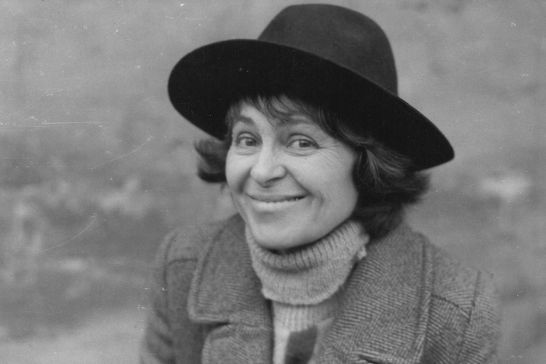16 - 26 October 2019: Close-Up on Kira Muratova

Photo coutesy of the Oleksandr Dovzhenko National Centre
A year after her passing we remember the neglected – Romania born – Ukrainian auteur Kira Muratova with a rare programme of films selected from across her expansive career, presented in collaboration with the Oleksandr Dovzhenko National Centre.
"Harmony doesn't mean balance. You must destroy something symmetrically, break the rules. It's only then that things grab you." – Kira Muratova
“Kira Muratova’s trenchantly caustic, sonically layered, and furiously sensorial cinema spans twenty-one films made over six tumultuous decades, products of her bracingly original cinematic imagination, one as distinct as Varda’s, Akerman’s or Chytilova’s. A formidable equal of her (post)-Soviet contemporaries Aleksandr Sokurov and Aleksei German Sr., Muratova’s path toward inclusion in what Tilda Swinton calls the “intergalactic canon” of cinematic masters has long been deterred by a lack of wider appraisal and exhibition of her work beyond Eastern Europe, despite resounding critical, scholarly, and cinephile acclaim. Her challenging and radical oeuvre bodies forth through a set of paradoxes. She was one of the most suppressed (and most transgressive) filmmakers of the Soviet cinema. Party censors considered her films “mannered”, “bourgeois”, “lacking in realism and motivation” and having a “deliberately complicated style”. Through much struggle and several shelved films, she was allowed to make only six films in the period between 1967 and 1987. After the banning of her second film The Long Farewell in 1971, she was “disqualified” from directing at Odessa Film Studio, demoted to scriptwriting for hire. Yet with the watershed of her epochal grenade The Asthenic Syndrome (1989), which won the Silver Bear at the 1990 Berlinale – and after the fall of the Soviet regime – she entered a fertile period, making a film every two or three years well into the twenty first century, becoming one of Russian-language cinema’s most celebrated figures. Considered a ‘national treasure’ and winner of five Nika Awards (Russia’s Oscar), her belated recognition was an irony not lost on the wary Muratova herself.
[…]
From first to last, Muratova’s films were witness to and expression of the sea change of political regimes and cultural values, but also spoke to her own obsessions and ideas about theatricality, artifice, predation, passion, women’s desire, authority and power. Dennis Lim dubbed her the “high priestess of Soviet absurdism”. Diverse in their forms and flights, and often bewildering and discomfiting by design, her films never fit neatly into any taxonomic accounting of movements and genre. They spanned promiscuously across romance (Brief Encounters, Getting to Know the Big Wide World); comedy (Passions, Sentimental Policeman); literary adaptation (Change of Fate and Chekhovian Motifs); quotidian horror, tragedy and darkest of farce (Three Stories, Melody of a Street Organ, The Asthenic Syndrome); and from relatively straightforward narrative organisation in her black & white "provincial melodramas" of the late 1960s and early 1970s, to a later, freer navigation of elliptical, episodic structures and wild refrains in her films of the post-Soviet period. Muratova and her films have in different measures been considered "difficult" and the acerbic quality (both personal and aesthetic) that she cultivated is an essential ingredient to her aesthetic freedom, self-determination and creative pleasures.” – Elena Gorfinkel
These programme notes are an excerpt from Elena Gorfinkel's essay Kira Muratova's Searing World which has been revised and republished here in to coincide with this programme. This essay was originally written to accompany the “Kira Muratova: Filmmaker in Focus” programme of films screened at the 15th Berwick Film & Media Arts Festival in September 2019.
Brief Encounters
Kira Muratova, 1967, 98 min
Russian with English subtitles
FULL DETAILS
The Long Farewell
Kira Muratova, 1971, 97 min
Russian with English subtitles
Introduced by Elena Gorfinkel
FULL DETAILS
Getting To Know The Big Wide World
Kira Muratova, 1979, 75 min
Russian with English subtitles
Introduced by Elena Gorfinkel
FULL DETAILS
The Asthenic Syndrome
Kira Muratova, 1989, 153 min
Russian with English subtitles
Introduced by Elena Gorfinkel
FULL DETAILS
Eternal Homecoming
Kira Muratova, 2012, 114 min
Russian with English subtitles
FULL DETAILS